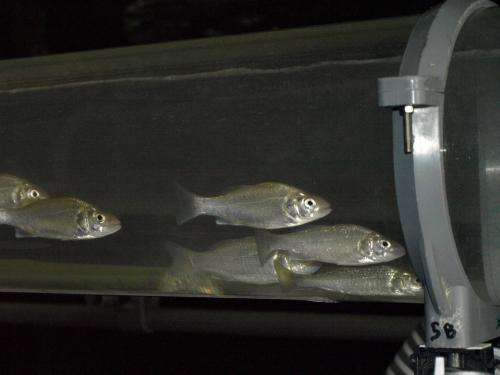Treating oil spills with chemical dispersants: Is the cure worse than the ailment?

Treating oil spills at sea with chemical dispersants is detrimental to European sea bass. A new study, to be presented at the Society for Experimental Biology meeting in Valencia on July 6, suggests that although chemical dispersants may reduce problems for surface animals, the increased contamination under the water reduces the ability for fish and other organisms to cope with subsequent environmental challenges.
A team of researchers headed by Prof Guy Claireaux at the University of Brest in France looked for the first time at the effects of chemically dispersed oil on the performance of European seabass to subsequent environmental challenges.
The researchers designed swimming challenge tests in an 'aquatic treadmill', similar to the tests used in human medicine for health diagnosis. They analysed European seabass' maximum swimming performance, hypoxia tolerance and thermal sensitivity as markers for their capabilities to face natural contingencies. They then exposed the fish to untreated oil, chemically dispersed oil or dispersant alone for 48 hours. During the following 6 weeks they measured individual growth and then once again analysed the seabass' performance in the swimming challenge tests.
Oil exposure impacted the ability of fish to face increased temperature, reduced oxygen availability or to swim against a current and these effects were further aggravated with the addition of the dispersant. The dispersant alone had no effect on the ability of fish to face the challenge tests.
Prof Claireaux said "An oil slick reaching the shore is not good for tourism and organisms living on the coast line. Treating the slick at sea will avoid or reduce these problems affecting surface animals (birds and marine mammals). On the other hand, oil dispersion will increase the contamination of the water column and the organisms that occupy it."
Though applying dispersants at sea may reduce the environmental and economic impacts of an oil spill reaching the shoreline, these results show that the choice of response deployed to deal with a spill involves a trade-off between the effects at the surface and in the water column.
More information: This work will be presented at 14:55 on Saturday 6th July 2013.
Provided by Society for Experimental Biology










.jpg)








